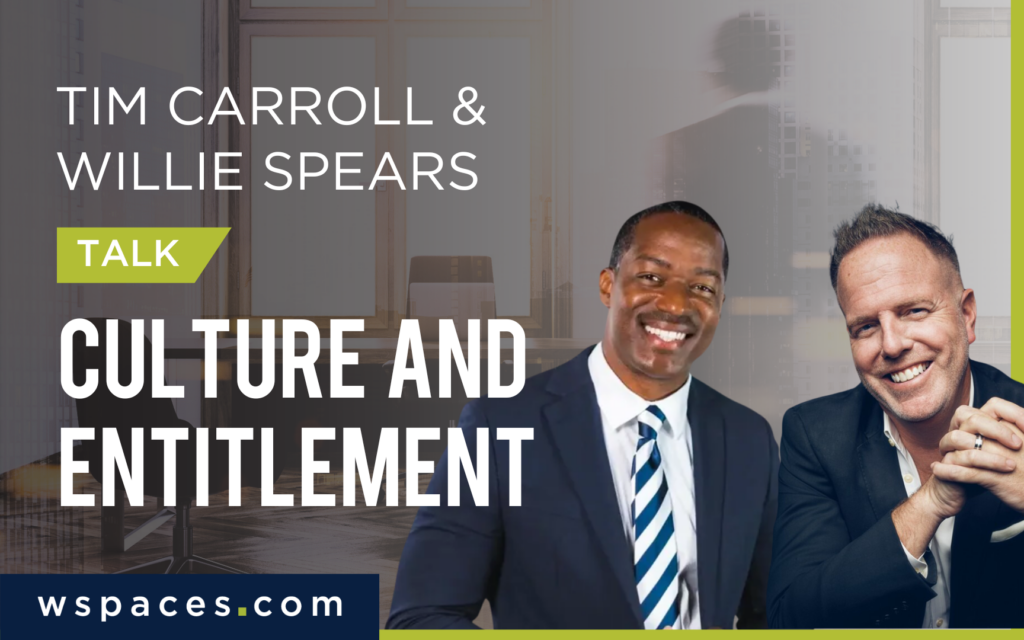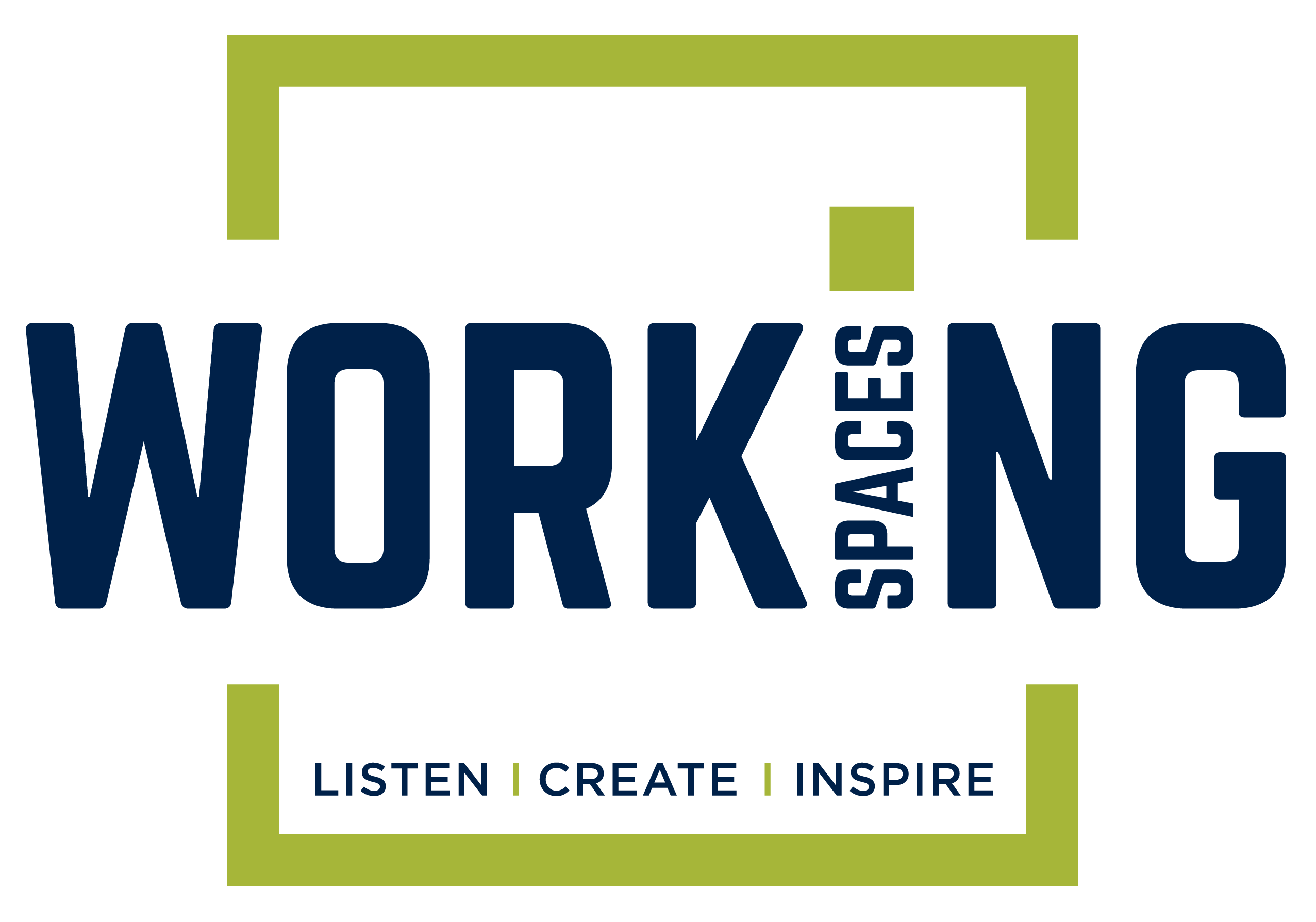
The world of work has changed post-pandemic, particularly the relationship between employers and employees, with both sides bringing different expectations as to what the work relationship and the workplace should be. Yes, employers should work to make employees feel valued but, in return, employees have an obligation to their employer, their colleagues, and their clients.
In this recent episode of the Culture at Work podcast, Working Spaces COO Tim Carroll discusses workplace culture and entitlement with guest Willie Spears, coach, educator, and motivational speaker. Below is an excerpt of their conversation, edited for length and clarity. Listen to the full episode here.
Changing Entitlement Mentality
Tim Carroll: Entitlement—how detrimental do you feel that word is, that mentality is to an organization, to a team, to a school?
Willie Spears: We’re all entitled. We don’t want to admit it. If someone at your job walks in and the air-condition is broken, after about an hour, someone’s gonna come to you and say, ‘Hey, Tim, you know that the air is not working?’ Now, of course you know. You can feel it too, but they are entitled to a comfortable room…We automatically believe ‘this’ is supposed to happen. So what happens in organizations is when we try our best to provide a harmonious culture, especially coming out of COVID, now we’re going over the top to make sure everyone feels comfortable, we talk about work-life balance, we talk about making sure you look out for them outside of work, and not overworking them and caring about them as a person—all those things, now they become entitled. These were extra things. Now they’re the norm.
We’re so entitled that now the norm has not become extraordinary. If you’re elite, the extraordinary is your norm. Doing extra—that’s your norm. Coming in early—that’s your norm. Staying late—that’s your norm. But now that’s not the case. Most of the businesses I speak to…entitlement seeps in like a cancer and if you don’t cut it out, it’s going to eat away at your entire organization. All the things you’re doing to show them you appreciate them, sometimes they feel like you owe me that, and that person has a worker’s mentality, not an owner’s mentality.
The owner mentality says ‘I’m not entitled. I don’t care how much money I have, I gotta go get it every single day’—that’s the owner mentality. The worker mentality is ‘I’m just here punching a clock, and they better treat me this way, this way, this way.’ And you need people around you that have an ownership mentality, even if they don’t ever plan to be an owner. They need to think like ‘this is my business; this is our business’—not ‘it’s Tim’s business and I’m working for Tim.’ No, ‘I’m working with Tim, and together we’re going to take this thing to another level.’
Tim Carroll: A very, very smart man once told me that you can’t have someone feel like you need them more than they need you in an organization, and that’s a tough thing for some people. But I think post-COVID, you hit the nail on the head, that’s where things started going, that this entitlement mind-set took off just a little bit.
Willie Spears: I mean, so now, ‘Why can’t I just work at home?’ You would never say that before COVID, you would never say to your boss, ‘Can you pay me the same amount of money you’ve been paying me, but I’m going to work from my house every day.’ But now we feel entitled, so we gave you a little rope and now you want the whole thing.
Building Culture
Tim Carroll: You do a lot of work with schools. We do a lot of work with schools also, and we truly do believe that space can affect culture, but I’m interested in your experience. You speak to educators all the time; you speak to schools. What’s the difference you see in building culture in a corporate setting versus an educational setting?
Willie Spears: Great question. Leadership is ownership and ownership is leadership. In the schools, they have a guaranteed client that does not want the product they’re selling.
That’s very different than what you have. You have a client that realizes they need a new makeover with their furniture. They may not know what they need, they may not know how to order it or what it’s supposed to look like, but they realize they have a need. The client in the schools, they don’t even wanna be there! And so, you have to convince them that later on, way down the line, you’re gonna need this—and the smart ones know that you’re lying…So how do you motivate someone that knows they don’t need your product? So that’s different.
So that culture—and the answer is the same for both, by the way—that culture needs to realize the relationship is going to be the reason we get the results we desire. In the corporate world, what the corporate worker has to realize is if I’m the cashier or if I’m in marketing or if I’m in sales or if I’m in facilities or logistics, if I don’t do my job to the best of my ability, then everyone suffers. Where in a school, the teacher is the CEO of the classroom, and they’re judged about what happens in that classroom. The two things they have in common is both build a relationship, and both is all about numbers. The quantitative data is gonna tell us if you are doing a good job or not.
Measuring Culture
Tim Carroll: Your book “Culture Creators,” in there you talk about this—and I’m a firm believer of this point as well—that which isn’t measured won’t grow. You gotta measure things to grow. So, what would you suggest to people that they should use as tools to measure culture?
Willie Spears: What I’ve seen work the most is compare-and-contrast. So, when you compare and contrast, you ask yourself, you know, ‘Give me the top five furniture companies’—and this is the person that works for your furniture company—’Give me the top five furniture companies, in your opinion.’ And then we ask in another meeting, you know, ‘Give me the top five restaurants according to furniture. Give me the top five, the top three hospitals according to furniture.’ So, we ask specific questions to get the qualitative data that we want because everyone compares, whether they want to or not. Every restaurant sells chicken, but when you want a chicken sandwich, you go to a certain restaurant for a reason. So, we always compare and contrast without even realizing it…We compare and contrast expectations with reality. Well, if you’re an organization, you gotta really believe that your reality is we’re gonna be the very best every single day.
So, the problem with measuring culture is it’s not like measuring, you know, football combines. It’s not like that. It’s not quantitative. There’s no number attached. You measure culture qualitative. What that means is you have to look at the entire thing, and I use expectations and evaluations, and like you said, what gets measured gets done. You have to measure it over and over.
How do you measure if your organization is doing well? You have to ask difficult questions and then own it. When they answer, you have to own it. Ten people can’t be wrong. If 10 people in your organization say the same exact thing, they can’t be wrong. So, I ask you about that. What are your expectations, and are they clear? Does everyone in your organization know their expectations? How will they be evaluated on that, and how often? Is that clear? If you don’t have great communication in your organization, you will not be able to measure.
And so, to answer your question, the way that I believe you measure is you have strategic questions to ask your organization on the front end, on the back end, and you do it often, you measure often, and then they’re gonna tell you.
Listen to the Culture at Work Podcast from Working Spaces
Want even more insights for building and maintaining a strong corporate culture? The Culture at Work podcast brings together experts in the fields of architecture, design, management, real estate and more to explore a wide range of approaches to unlocking the potential of your workspace and elevating your organization’s culture.
Browse all our episodes here or listen on your favorite streaming platform.
